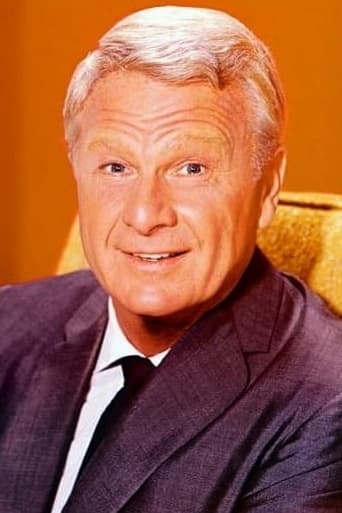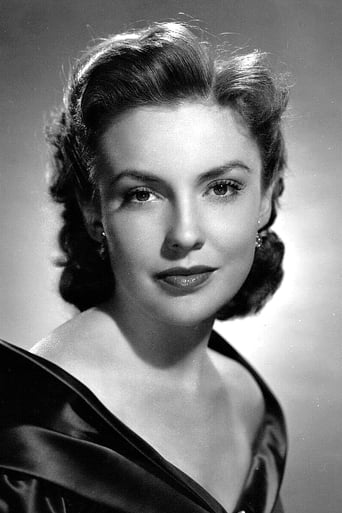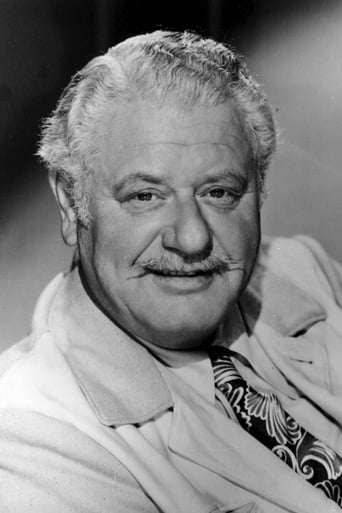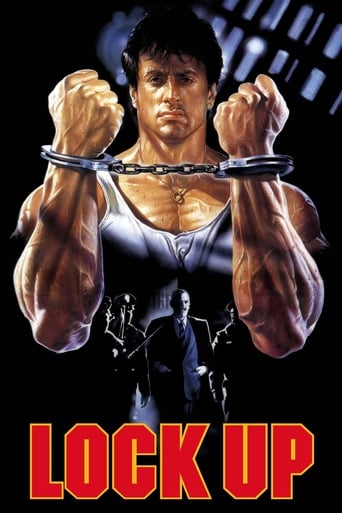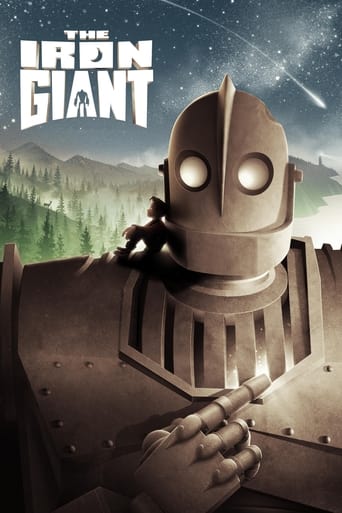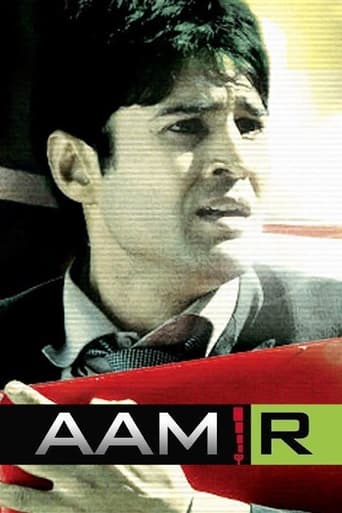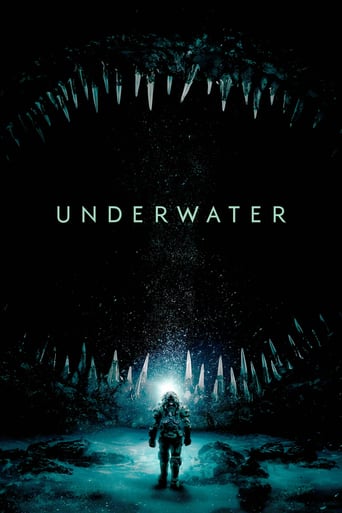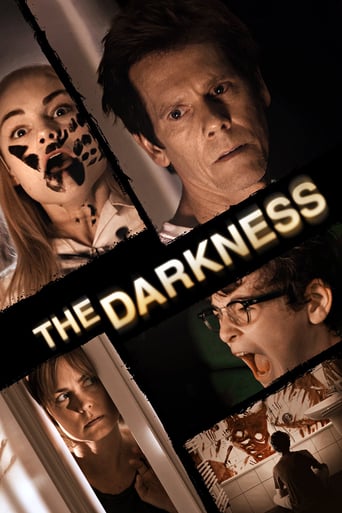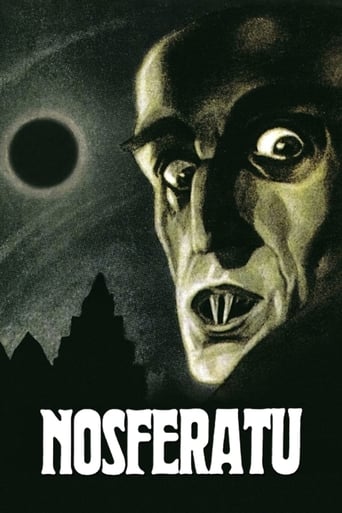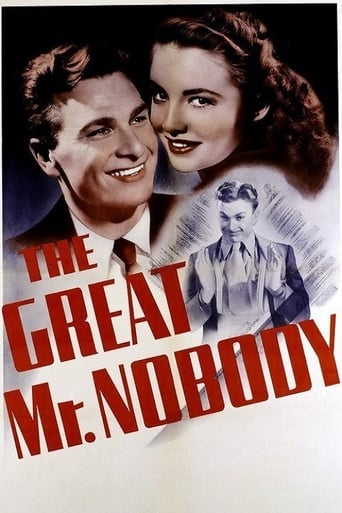
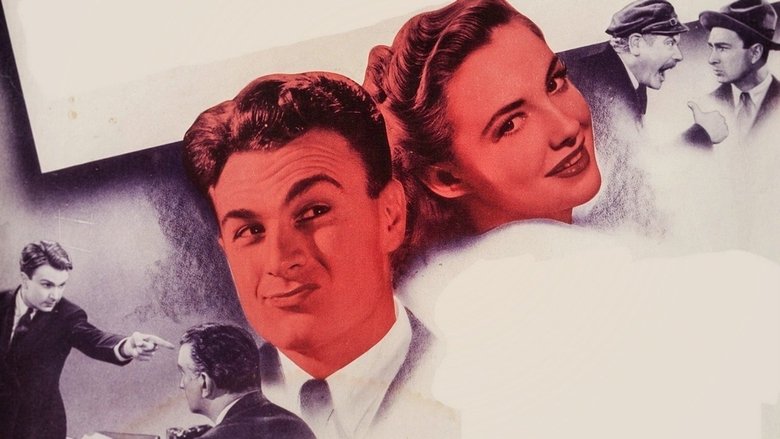
The Great Mr. Nobody (1941)
A publicity man promotes his newspaper, but finds his boss always steals the credit.
Watch Trailer
Cast


Similar titles
Reviews
So much average
Lack of good storyline.
Better Late Then Never
After playing with our expectations, this turns out to be a very different sort of film.
Mr. Nobody is an amusing allegory about the effect of different ethical systems. Dreamy Smith represents innocence and good intentions. In his relations to his close friend and love interest Mary Clover we see that his innocence has a downside: she wants to get closer, but he doesn't pick up on her hints. Her intentions are just as good as Dreamy's, but she is not innocent like him. She's constrained by her female social role, but she understands everything that's going on. She can't make a move on Dreamy or at work - she has to play it passive - but she's under no illusions. With his innocence comes a power that no other character has: a creative ability to generate ideas that generate value and meaning. His boss, John Wade, takes credit for Dreamy's ideas, and doesn't give him the bonus money he deserves. He lies to Dreamy about it, and Dreamy doesn't question him, but Clover tells him to man up.Meanwhile another character, Dreamy's roommate the Skipper, is trying to use him to buy a boat - the Viking - to go roving the seas. He's not a bad guy, but he is a user. Dreamy gives up his dream of sailing the seven seas to help a poor crippled kid and his family, and he's even willing to give up his love for Mary to get Limpy an operation to fix his foot. Finally when it seems like Dreamy is toast - his crooked boss Wade fires him from his job after taking credit for all his ideas - Mary steps up and forces Wade to hire him again. It's then that Dreamy commits one more act of senseless generosity: he jumps in the water to save Wade from drowning, though Dreamy can't swim. Wade has to save Dreamy from drowning. Dreamy's good heart compels the people around him to become better themselves. Mary does too, but to a lesser extent. She has to threaten Wade, but Dreamy does it by faith. The ending is a little odd: he is given an award for civil courage, and acclaimed by the people who took advantage of him before, and is about to claim Mary as his beloved, when he gets notice that he's been drafted into the army for WWII. Once again he treats it as a privilege - keep in mind this was 1941, and though the US wasn't in yet, it was widely believed that we would have to get involved before it was over.The power of Dreamy's innocence and good intentions warps the social network around him to make everyone else better. We see this at the personal level, but the ending sends the message that the US will also do this for global geopolitics by making sure WWII ends with the right side on top. A little propagandistic, but well- intentioned.
Hapless New York newspaper ad salesman Eddie Albert (as Robert "Dreamy" Smith) is finally going to fulfill his dream. He plans to quit work, buy a sailboat and head out for adventure at sea. After a mishap disposing of his automobile, Mr. Albert must cancel the trip. Pretty co-worker Joan Leslie (as Mary Clover) is happy, but jealous roommate Alan Hale (as "Skipper" Martin) thinks Albert should stop dating Ms. Leslie and save money for his share of their boat. Albert gets into more money problems when he decides to help partially crippled paperboy Dickie Moore (as "Limpy" Barnes)...Hoping for a bonus at work, Albert comes up with ideas to boost the circulation of his newspaper, but sneaky John Litel (as John Wade) takes all the credit. Albert gets in more trouble for helping future "Bowery Boy" William "Billy" Benedict (as Jigs) get a job. As if that wasn't enough, handsome William Lundigan (as Richard Amesworth) moves in on Leslie..."The Great Mr. Nobody" is quite pleasant, with future "Green Acres" star Albert shining in a whimsical role. It's interesting to hear Mr. Hale being called "Skipper" throughout as he resembles son Alan Hale Jr., familiar as the Skipper on "Gilligan's Island" in the 1960s. However, this Hale acts differently (more like a stocky Robert Young). Hale Jr. patterned his skipper after Oliver Hardy. Also interesting is how much you Moore's crippled newsboy resembles "Captain Marvel Jr." from the best selling comic book introduced shortly after this film. The ending is weak, but certainly fit the times.****** The Great Mr. Nobody (2/15/41) Benjamin Stoloff ~ Eddie Albert, Alan Hale, Joan Leslie, Dickie Moore
Eddie Albert plays a mild-mannered super-saint who is lowly clerk at a paper. He keeps coming up with great promotion ideas the editor Litel steals for his own advancement, but Albert puts up with it (to his fiery girlfriend's disgust--as played by Joan Leslie). Meanwhile, Albert helps everyone from Limpy the newsboy played by Dickie Moore, and Skipper played by Alan Hale Sr. It's all quite absurd--Albert going without money or food in order to help others--altruism at its almost Christ-like zenith. Then Albert loses his job, but he's such a dupe that it takes Leslie to threaten Litel in order for Albert to get his job back, and then to top it off, Albert immediately gets drafted. He's ecstatic: "Finally what I've been waiting for!" he chirps with a salute to the flag, and the film ends, thankfully. Just a piece of fluff to fill the bottom of a double-bill.
Although not really a comedy, it is certainly watchable on a rainy day. It has a cast that is excellent, you can see two faces of stars you know from TV, Alan Hale (Sr. who looks exactly like his son who was on Gilligan's Island) and Eddie Albert who was on Green Acres (and his son has done a number of things). Plot is thin and so idealistic it could never be made today. I mean Dickie Moore (now married to Jane Powell) plays a a paper boy called "Limpy". Oh, and Alan Hale is actually called Skipper! Really it's a walking trivia contest answer. Too frustrating to be fully satisfying, pathos rampant really. John Litel supports well and Joan Leslie is pretty in her usual vacant way.


